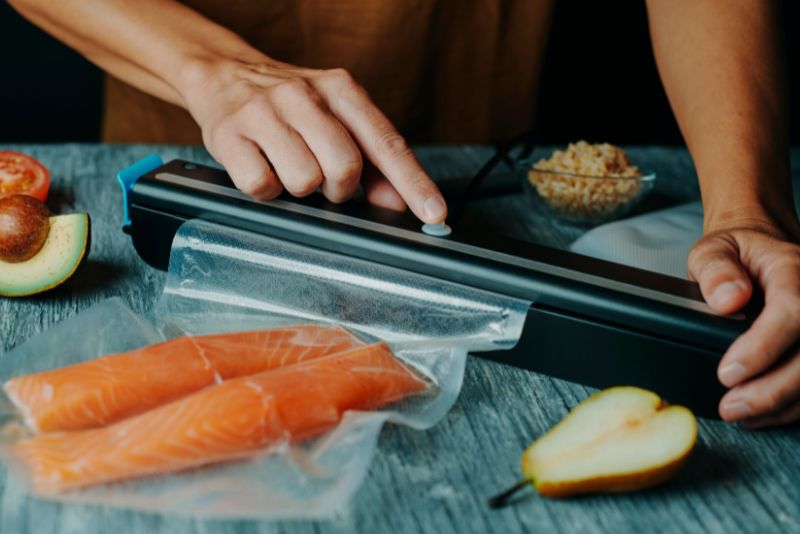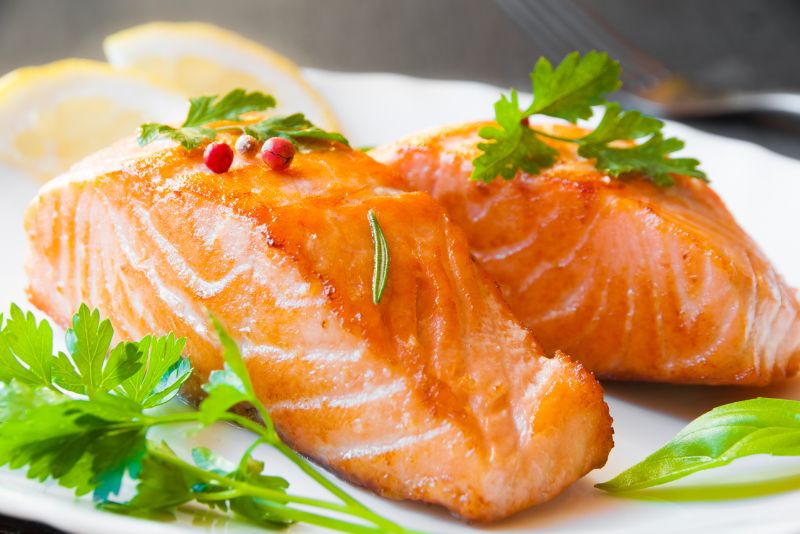I have a house full of people; large portions of cooked food often lead to leftovers. I have found myself questioning multiple times if something I cook can be frozen to have less waste. This includes cooked salmon!
Table of Contents
Can You Freeze Cooked Salmon?
Fortunately, yes! You can freeze cooked salmon! Though, the biggest thing you have to think about is the quality of taste diminishing over time once it has been frozen. This is a concern you have with almost any food you freeze, however, as all foods taste differently when freshly made versus being frozen for any period.
The best way to ensure your salmon will taste well after it’s frozen is to ensure it is frozen properly. If any of the steps are not done correctly, the food’s quality and shelf life could be sacrificed.
Steps to Freeze Cooked Salmon
Cooling
You must always let your food cool before putting it in the freezer. This helps with the freezing process. Though, if your food has already cooled, this process might not be necessary
Portions
This depends on how many people you plan to cook for later. Whether you’re prepping for yourself or others to consume your salmon at a later time, portioning is important. I like to make small portions.
With smaller portions, you can always grab more portions if you don’t have enough in the particular one you’ve chosen, but if your portion is too big, you could be left with wasted food. At this point, it’s helpful to note that your salmon should not be frozen a second time, so it is very important to keep your portion sizes in mind.
Wrapping
You should do this with all your food before storing it in a freezer bag. Some people do this step with plastic wrap or aluminum foil, but I like wrapping my meats in parchment paper before putting them in a freezer bag to be frozen.
Parchment paper will not absorb the liquid from your fish and will keep it fresher and, in my opinion, better tasting when you take it out. This method can also be used to help prevent freezer burn, but in the case of your cooked salmon, this shouldn’t be an issue as it shouldn’t be in the freezer for that long.
Packing

Once you’ve wrapped your salmon in parchment paper, place it in a freezer bag of the desired size. The smaller, the better. Smaller bags help to make sure there is not an abundance of air in the bag, as air will not help with freshness.
You can also use a vacuum sealer for the packing and sealing process. Vacuum sealers are great because they suck the air out of the bag and use heat to melt the plastic of the seal to keep the package from coming open while in the freezer. Your food will stay fresh even longer with a vacuum sealer!
Sealing is one of the most important processes for keeping your salmon fresh. Once your food is in the freezer bag, you can push the bag gently to get all the air out and zip it closed, or you can use a straw to suck the air out of the bag and seal it. The less air in the bag, the fresher your food will be!
Storing
This is probably the second most important part, as you don’t want to compromise the quality of your salmon. Make sure when you place it in your freezer that you do so in a way that nothing will be put on top of it. If you place heavier things on top of your food, it can be squished down. This will lead your salmon to be very flat and unappealing.
Labeling
This is necessary to use with all your frozen foods! Make sure you write on the bag what is inside and the date on which it was placed into the freezer. This removes any guesswork you might have so that you can keep track of how long it has been in the freezer.
Foods without labels could end up accidentally being consumed past their acceptable age. This labeling is the best way to ensure your food’s freshness without the guesswork.
How Long Can You Freeze Cooked Salmon?
I would not personally suggest letting salmon stay frozen for super long. Nothing more than 3-4 months. I feel like it would be best to use it within the first month or so. Once frozen and as your cooked salmon sits in the freezer, it will lose more and more of its quality.
How To Thaw Frozen Cooked Salmon?

Like most meats, salmon needs time to thaw out. It is best to take the salmon out of the freezer and put it in the fridge overnight. Thawing this way leads to better quality foods, and it is safe as bacteria cannot grow as long as your food is cooled or refrigerated.
Once your cooked salmon is thawed, it might be a little watery or have moisture either on it or in the package. It is best that once you take it out, put it on a plate and dab it repeatedly to get the excess moisture off. If this process is not done, it could affect the texture and quality once its reheated.
Frequently Asked Questions
Can you refreeze cooked salmon?
No! This is not recommended! It can compromise the quality of the taste of your food.
How can you use leftover cooked salmon?
Salmon salad, fried rice, omelets, salmon quiche, salmon chowder, and many other dishes can all be made with cooked leftover salmon. It is important to note that cooked salmon should not be re-heated more than once as it will become tough and dry.
How long after Cooked Salmon is thawed should it be eaten?
Around 24 hours. Never try to keep your Salmon after this point, as it could have begun to spoil!
Is it better to store your salmon when it’s cooked or raw?
It is better to store it when it’s cooked as it will be able to stay fresh in the freezer for longer. Cooked salmon has a freezer life of 3-4 months, as raw fish should be used within 2-3 months of being frozen.
If you don’t freeze your salmon, how long can cooked salmon last in the refrigerator?
Cooked salmon can last up to 3 days in the refrigerator if kept in an airtight container. This is why it’s important to freeze your salmon if you do not intend to use it within 24 hours. If it is left in the fridge for longer than 24 hours, it can start to grow bacteria and spoil.
Conclusion
Cooked salmon is a delicious and versatile food that can be frozen. It is important to remember that once it is thawed, you must eat it within 24 hours. If it has not been eaten within 24 hours, it’s best to throw it out as it could have started to spoil.
